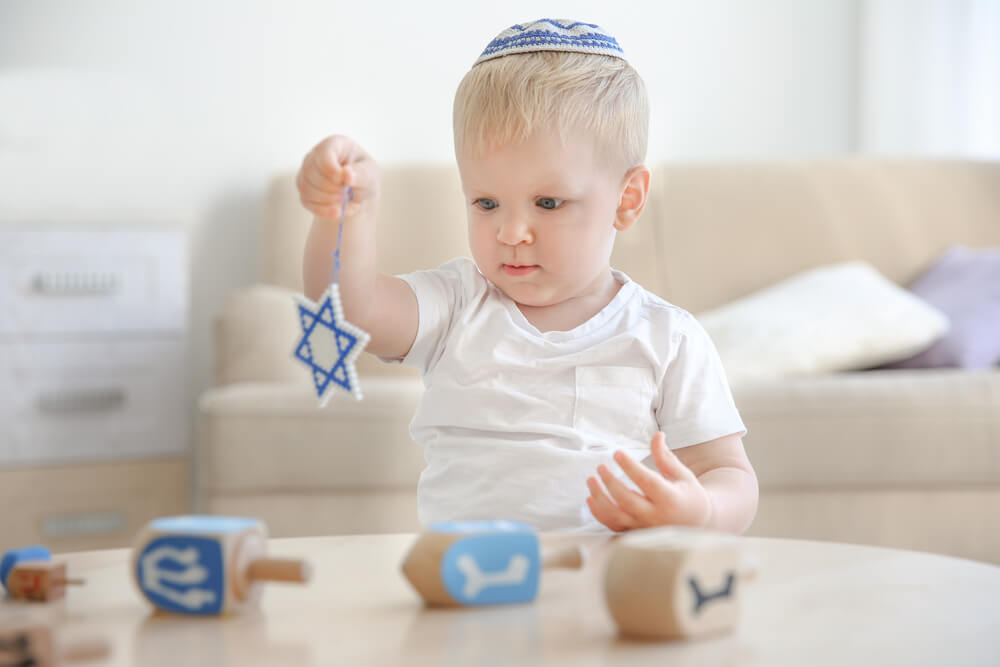The birth of the firstborn son has carried immense significance in biblical times, but it still remains a significant segment of our lives today as well.
If a mother gave birth to a boy first, the firstborn son would be consecrated to divine service, and the father was to give his son double of his possessions as an inheritance (from birthright).
Later, in medieval times, fathers often vowed the firstborn male to study the Torah. Later on, the eldest boys of the family would become scientists or were sent to study while the other brothers would learn different trades.
The ceremony of the Pidyon HaBen also demonstrates the importance of the firstborn son in the bible.
The ceremony is also referred to as the firstborn son’s redemption”, and during the event, the father of the said boy needs to redeem the son by giving one of Aaron’s priestly descendants (a kohen) five silver coins. Just like in the case of the Jewish bris, the Pidyon HaBen ceremony also has a time-sensitive characteristic since the father should give the silver coins exactly thirty days after the son’s birth.
The Reason Behind the Pidyon HaBen Ceremony
As mentioned above, firstborn sons were to become priests in biblical times. However, following the Exodus from Egypt, and after the nation had committed the sin of serving the Golden Calf, the role of becoming priests was taken away from Jewish firstborns. Instead, it was given to the kohanim, the descendants of the High Priest Arron, who were from the Tribe of Levi.
After this act, the Pidyon HaBen was introduced, meaning that all firstborn sons of Jewish families should be redeemed. The redemption would mean they would rebuy the dedication to God they’ve lost while worshipping the Golden Calf.
Because the kohanim were performing the divine service initially meant to be carried out by firstborn sons, firstborn baby girls don’t need to be redeemed because they didn’t serve the Temple to begin with, and they (nor their firstborn women ancestors) didn’t provide priestly service while worshipping the Golden Calf at any point.
The Rules of Pidyon HaBen

The Pidyon HaBen ceremony is strictly performed when a minimum of thirty days have gone by from the birth of the firstborn son. In case the 31st falls on a festival or a Shabbat, the family or kohen may choose to delay the redemption, mainly because the community isn’t allowed to conduct any business transactions these days. Note that the redemption ceremony can be performed following sunset on the night after 31 days (before these days are usually counted from sunset to sunset); it will usually be performed the following day.
However, when the 31st day constitutes a day for fasting, the Pidyon HaBen ceremony will usually happen the previous night so it can be crowned with a celebratory feast.
Lastly, the family can perform the ceremony precisely on the thirtieth day after birth if there’s no chance of having it the following day when at least one month *synodic) has gone by since birth.
Pidyon HaBen Exceptions
When talking about the firstborn son, the bible has strict rules, but in some cases, there are a few exceptions to the general rules.
For instance, the baby doesn’t need to be redeemed when a woman’s firstborn wasn’t born “naturally” (meaning the mother had a cesarian section). There’s also no need for redemption when the birth of the firstborn son came after a miscarriage that took place after three months of being pregnant. On the other hand, when a miscarriage happens within the first 40 days of being pregnant, the firstborn performing the Pidyon HaBen ceremony will be necessary. Also, if the miscarriage took place after the forty day-period mentioned above but the fetus hasn’t developed any distinguishing characteristics, the ceremony of the firstborn will be performed. Still, the father won’t have to say the blessings during the ceremony.
The kohanim and the Levites do not need to redeem their firstborn sons with the protocol. The reason for this is that they became the replacement for the firstborn divine servants. As such, the firstborn son from a daughter of a Levite doesn’t require redemption, just like a firstborn son of a kohen’s daughter when the father follows the Jewish fate.
The Pidyon HaBen Ceremony
Traditionally, the father is responsible for bringing the son to the kohen. Then he recites either specific formula or answers a series of ritual questions that signalize that the baby is, in fact, an Israelite firstborn and that his mother did not have any miscarriages in the past.
Then, the kohen would ask the father whether he’d prefer the five silver Pidyon HaBen coins (that he should pay) or the child. After stating that he prefers the child and not the money, the father recites the pertaining blessing and hands over the money. Then the kohen will hold the Pidyon HaBen coins over the son while declaring him redeemed and blessing the firstborn.
Usually, the Pidyon HaBen ceremony is held before a minyan or a quorum of ten men. Furthermore, the son will sometimes be presented on a tray made out of silver with jewelry on the tray that was lent by the women who attend the ceremony.
Religious experts state that the act of decorating the tray with jewelry is to contrast the spiritual practices during the worship of the Golden Calf when jewelry and gold were used for sinful purposes.
Furthermore, the ceremony usually begins with a festive meal (in contrast to a wedding or a brit milah), except in the case of Sephardic families where the ceremony takes place first.
There are places where the guests invited for the meal each receive cubes of sugar and gloves of garlic to take home with them. This is to extend the mitzvah as these items can be used to add flavors to larger quantities of food.
If the firstborn reaches the age of bar mitzvah and hasn’t been redeemed yet, he is the person responsible for arranging the Pydion HaBen mitzvah himself.
Pydion HaBen Coins

Religious authorities today believe that the Shekel HaKodesh, or the coins of the Temple, were heavier and contained more pure silver than the standard coins that were used for trade at the time in Israel.
The Halakha states that the father’s coins to redeem his son should come to the total amount of actual silver, falling between 96.15 grams and 102 grams.
While the coins are paid for the redemption of the child, the kohen can return them as a gift for the firstborn. When the money is returned as a gift, the laws of the religion won’t render the redemption ceremony invalid.
Embracing Jewish Traditions
The redemption ceremony of the firstborn son represents a religious event that has its roots planted back in biblical times. While the significance of the ceremony might have somewhat faded as modern times took over, it still signifies just how important the Jewish community’s devotion to God and the Holy Covenant is.
If you have more questions regarding the redemption ceremony or any other mitzvah, feel free to reach out to Dr. Krinsky, who’s more than happy to help you learn more.







